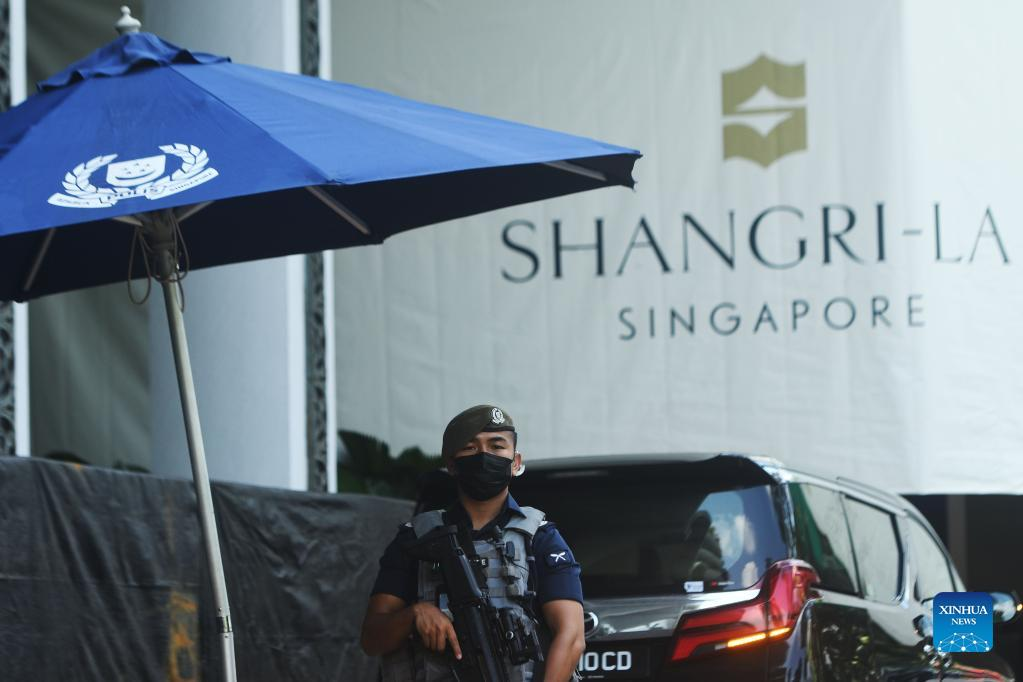Asia kicks off key security meeting on regional security after two-year suspension
A policeman is on duty for the 19th Shangri-La Dialogue in Singapore on June 10, 2022. The 19th Shangri-La Dialogue is to be held here from Friday to Sunday. (Photo by Then Chih Wey/Xinhua)
SINGAPORE, June 10 (Xinhua) -- The 19th Shangri-La Dialogue will be held here from Friday to Sunday after a two-year suspension due to the COVID-19 pandemic, focusing mainly on security in the Asia-Pacific region and viable solutions, including the China-proposed Global Security Initiative (GSI).
The three-day summit will hold seven plenary sessions, two ministerial roundtable meetings and three simultaneous special sessions for delegates from more than 40 countries or regions to exchange views on regional and global security issues. Senior defence ministers from Southeast Asia and the wider Asia region, Europe, North America and the Middle East are also expected to attend and speak at the Dialogue.
According to the agenda, Chinese State Councilor and Minister of National Defense Wei Fenghe will address a plenary session and is expected to introduce China's policy, principles and actions on safeguarding true multilateralism, regional peace and stability, and building a shared future for humanity.
A highlight of the summit is China's GSI, seen as another global public good that contributes Chinese solutions and wisdom to address global security challenges. Analysts said the initiative's implementation will attract enormous attention at the Shangri-La Dialogue.
"We look forward to welcoming Wei Fenghe to the IISS Shangri-La Dialogue and to hearing his views at this critical time for the regional and global security order," said James Crabtree, executive director of the London-based International Institute for Strategic Studies-Asia.
Mahmud Ali, associate fellow of the Institute of China Studies, University of Malaya, said China's GSI can be interpreted as a step toward developing "a community with a shared future."
The GSI views humanity as an indivisible, singular and united body sharing a single home planet, whose security affects every individual and society and therefore must be defended and advanced collectively, he said.
The expert believed that the vision has expanded the dimension of security from its "narrowly-defined political-military parameters" to "focus on the shared nature of planetary existence, dilute the emphases on divergences, and enable collaborative approaches to tackling trans-border challenges."
Other topics for discussion include managing geopolitical competition in a multipolar region, the Myanmar situation, climate security and maritime security.
Meanwhile, analysts also cautioned that the United States may use Asia's top security meeting this week to further pitch its Indo-Pacific Strategy, during which U.S. Secretary of Defense Lloyd Austin will make a speech titled "Next Steps for the United States' Indo-Pacific Strategy."
Senior Colonel Zhang Chi, an associate professor at the National Defense University of China, told Xinhua that the United States has spared no effort in implementing its Indo-Pacific Strategy to isolate China, divide Asian countries and undermine the central role of ASEAN in the region.
Additionally, Washington is trying to stoke tensions in the region by stirring up sensitive security issues involving Taiwan and the South China Sea to establish a "NATO for the Asia-Pacific" to encircle China, he added.
"Its purpose is to contain China's development, coerce or induce countries in the region to take sides with either China or the United States," Zhang noted, adding that it will "destroy regional solidarity and harmony and cause split, or even conflicts."
 |
Photos
Related Stories
- Asia kicks off key security meeting on regional security after two-year suspension
- Solution to world peace and security
- Commentary: Beware of U.S. attempt to peddle bloc confrontation in Asia
- Global Security Initiative offers solution to eliminating peace deficit: Chinese vice FM
- Exhibition of antiques from Asia opens in SW China
Copyright © 2022 People's Daily Online. All Rights Reserved.










